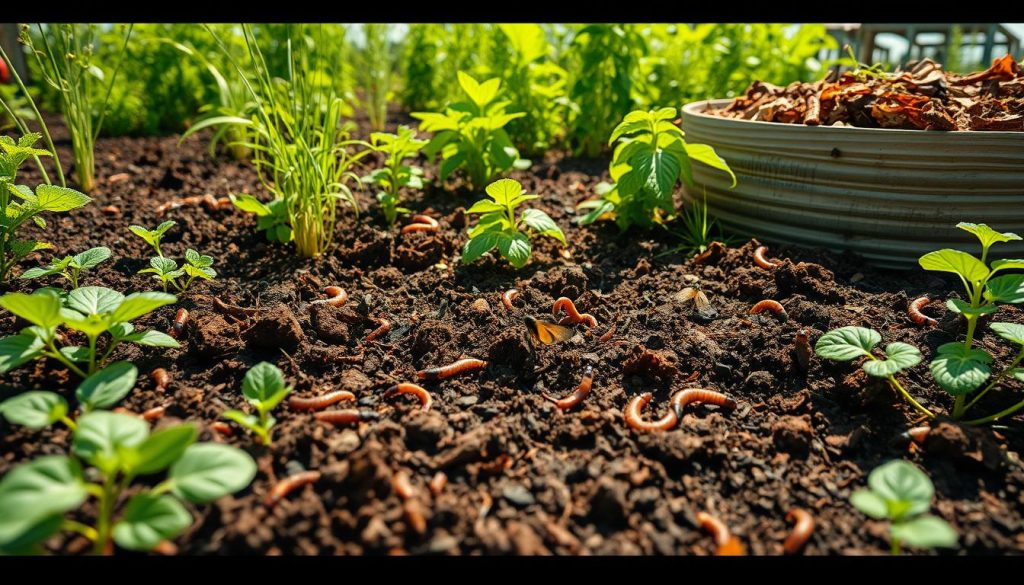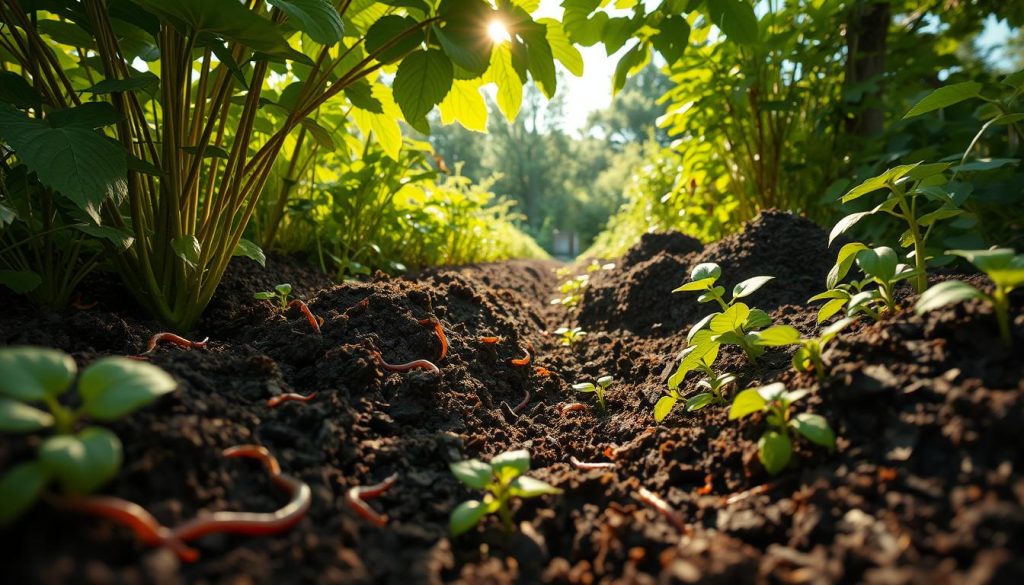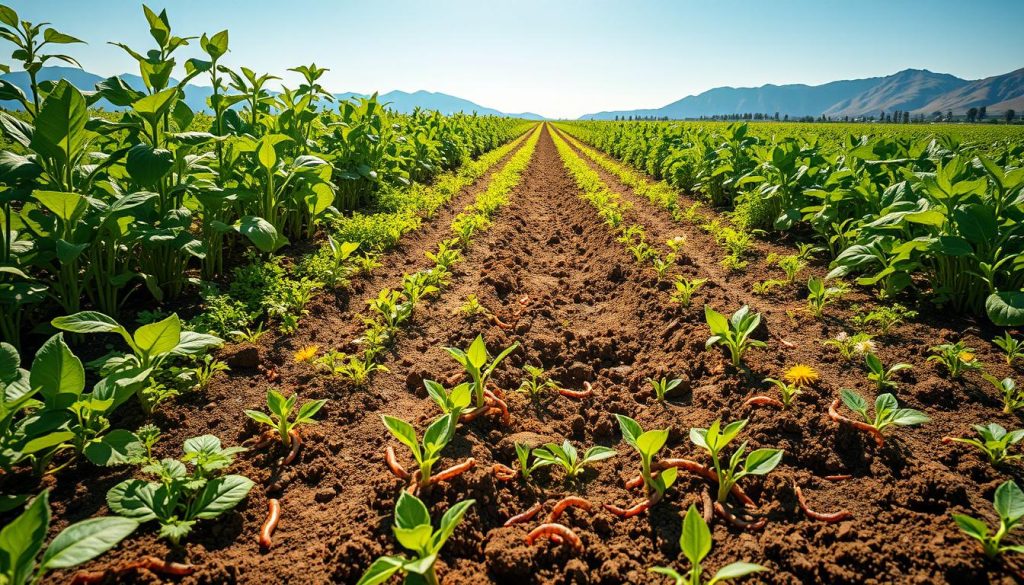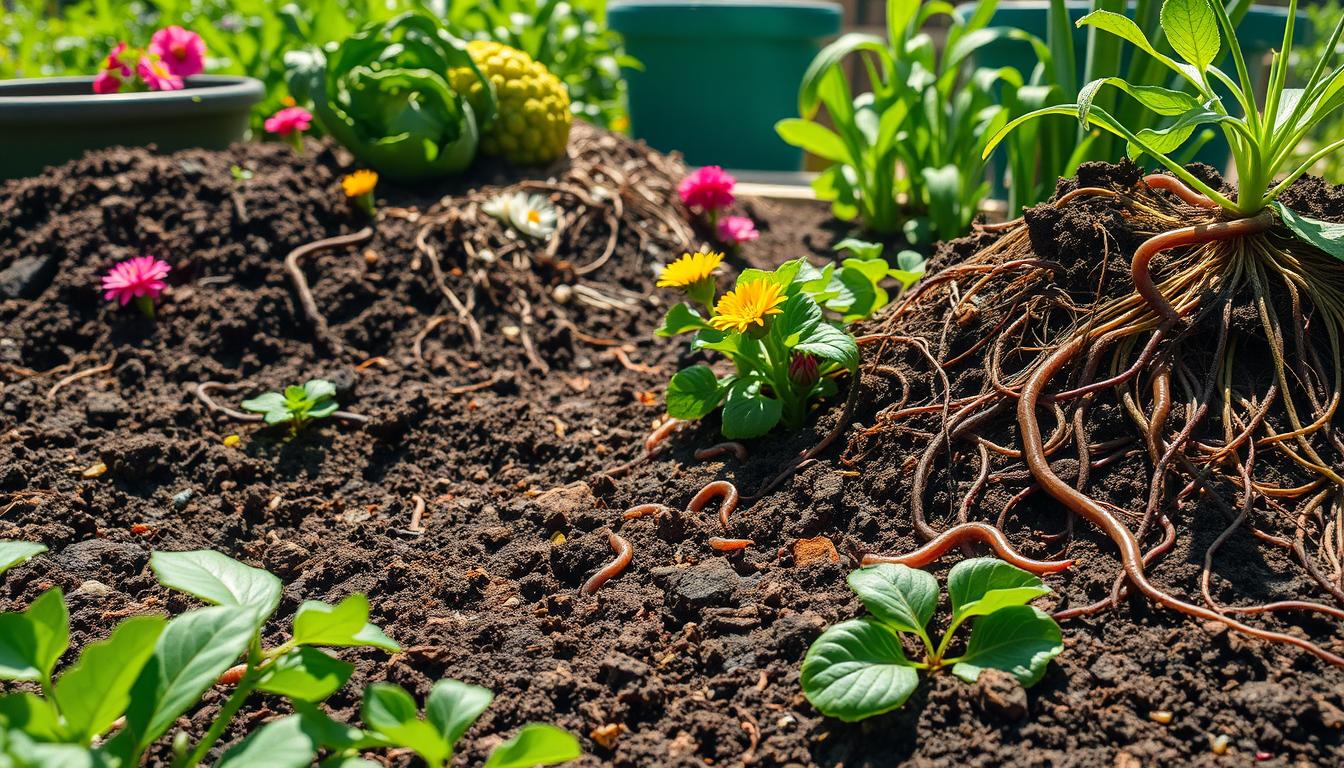As a gardener, I’ve faced the challenges of poor soil quality. I’m eager to share how to make your soil better naturally. To grow vibrant plants, focus on soil health tips that support a balanced ecosystem.
These secrets will help you create a garden with healthy soil. I’ll show you how to naturally improve soil health. You’ll get valuable tips to make your gardening better.
Understanding Soil Health and Its Importance
As I explore gardening, I’ve learned that healthy soil is key. It’s vital to grasp the role of soil health in plant growth. Using natural soil amendments and organic management helps create a balanced garden ecosystem.
Soil health means the soil can support life and plant growth. It’s full of life, from tiny microbes to worms, and is rich in organic matter.
What is Soil Health?
Soil health depends on organic matter, structure, and microorganism diversity. Adding compost and manure improves soil structure and water retention.
Why Healthy Soil Matters for My Garden
Healthy soil is crucial for my garden’s ecosystem. It supports plant growth and filters water, preventing erosion and pollution. Organic management reduces the need for harmful chemicals, making my garden sustainable.
The Role of Soil Microorganisms
Soil microbes are essential for soil health. They break down organic matter and solubilize minerals. Organic practices, like composting, foster their growth, leading to a healthier soil ecosystem.
Signs of Unhealthy Soil in My Garden
To keep my garden healthy, I need to know when the soil is not doing well. By using natural ways to make the soil better, I help my plants grow strong. Signs of bad soil include pests and diseases, which I can fight without harsh chemicals.
Some common signs of unhealthy soil include:
- Poor drainage, leading to waterlogged soil
- Low crop yields or stunted plant growth
- Increased susceptibility to pests and diseases
Checking the soil’s health is important. I can do this by simple tests, like checking the pH levels. Knowing the pH helps plants get the nutrients they need. By spotting these signs and fixing them, I make my soil better, leading to a greener garden.

By focusing on natural soil care, I make my garden a better place for plants. This way, I use fewer chemicals. Keeping an eye on my soil helps it stay healthy and fertile for a long time.
Natural Methods to Improve Soil Health
To keep soil healthy, using natural methods is key. These methods help plants grow well and keep the soil in good shape. They make the soil fertile and structured.
Some natural ways to boost soil health include:
- Composting: This breaks down organic stuff into a nutrient-rich soil mix that helps plants grow.
- Cover crops: They stop soil erosion, add organic matter, and home beneficial insects.
- Mulching: Organic mulch keeps soil moist, fights weeds, and controls soil temperature.
Using these natural methods can make your soil better. It also cuts down on the need for harmful fertilizers.
Improving soil health takes time, effort, and a commitment to natural methods. Working with nature helps create a strong ecosystem. This ecosystem supports healthy plants and helps the environment.
The Importance of Organic Matter in Soil
Exploring soil health, I’ve learned organic matter’s key role. Natural soil amendments help create a balanced ecosystem. This supports plant growth and soil health, benefiting my garden and the environment.
How Compost Adds Value
Compost is a treasure trove of organic matter. It enriches soil with nutrients and improves its structure. Using compost reduces synthetic fertilizer use, creating a natural growing space.
Selecting the Right Organic Materials
Choosing organic materials depends on my plants and climate. Leaf mold, manure, and green sand are great options. They enrich soil, support microorganisms, and aid plant growth.

My Top Tips for Incorporating Organic Matter
To maximize organic matter, add it to your soil regularly. Use compost or natural amendments as mulch to retain moisture and control weeds. Follow these tips for a healthier soil and more harvest.
Utilizing Natural Fertilizers
I’ve been looking for ways to make my soil better. I found that using natural fertilizers is key. They help plants grow and keep the soil healthy. This is good for my plants and the planet.
What Are Natural Fertilizers?
Natural fertilizers come from plants, animals, and minerals. They give plants the nutrients they need without harmful chemicals. Examples include compost, manure, and fish emulsion.
Homemade Fertilizer Recipes
Making my own fertilizers at home is easy and saves money. Here are a few recipes:
- Compost tea: Steep compost in water for a nutrient-rich liquid.
- Manure tea: Use animal manure instead of compost.
- Fish emulsion: Mix fish waste with water for a high-nitrogen fertilizer.
Tips for Application in My Garden
When using natural fertilizers, I follow some tips. I read the instructions and test a small area first. This ensures the fertilizer won’t harm my plants. I also consider each plant’s needs for the right amount of fertilizer. Using natural fertilizers helps my soil and keeps my garden healthy.
The Role of Crop Rotation in Soil Health
Crop rotation is key to keeping soil healthy. It cuts down on soil erosion, boosts crop yields, and supports biodiversity. By changing what crops grow in a spot, I help the soil and plants thrive. This method also breaks disease and pest cycles, improves soil structure, and helps nutrients move around.
Some benefits of crop rotation include:
- Improved soil fertility and structure
- Increased crop yields and quality
- Reduced soil erosion and nutrient depletion
- Enhanced biodiversity and ecosystem services
To start crop rotation, I plan a schedule for each crop. I consider their growth, nutrient needs, and pests. This way, I create a plan that keeps the soil healthy and supports sustainable gardening.

Benefits of Crop Rotation
Crop rotation brings many benefits, like better soil health and higher crop yields. It helps me use fewer synthetic fertilizers and pesticides. This makes my gardening more sustainable and good for the environment.
Building a Healthy Soil Ecosystem
To make soil healthy, we need to focus on creating a balanced ecosystem. This means adding good microorganisms, encouraging earthworms, and keeping the soil structure right. These steps help plants grow well and keep the soil healthy.
Introducing Beneficial Microorganisms
Good microorganisms are key to healthy soil. They break down organic matter, make minerals available, and help plants grow. I can add these microbes with compost, manure, or special products.
Encouraging Earthworms and Other Allies
Earthworms and other soil creatures are important for a healthy soil. They make the soil airier, improve water flow, and make nutrients easier for plants to get. To help them, I can add organic matter, till less, and keep the soil moist.
Maintaining Soil Structure
Keeping the soil structure right is vital for its health. This means not disturbing the soil too much, using cover crops, and adding organic stuff. These actions help the soil hold water better, let water in, and prevent erosion.
Long-Term Strategies for Soil Health
To keep your garden’s soil healthy, you need a long-term plan. Start by checking the soil often and making changes when needed. Look at the soil’s texture, nutrient levels, and the good bugs living there. This way, you can adjust your garden care to fit the soil’s needs.
Monitoring Soil Health Over Time
Test your soil’s pH and nutrients regularly. Keep track of these tests to spot trends. This helps you decide when to add something to the soil.
Adapting to Changes in My Garden
As your garden grows and the weather changes, you’ll need to tweak your soil care. Try new things like organic matter, cover crops, or natural fertilizers. This helps your soil and plants stay healthy.
Continuous Learning and Experimentation
Stay curious about soil health to keep your garden thriving. Look for new info, go to workshops, and talk to other gardeners. Keep trying new methods and see what works best for your garden.
By following these strategies, your garden’s soil will stay rich and full of life. This will help your plants grow strong and healthy for years.

